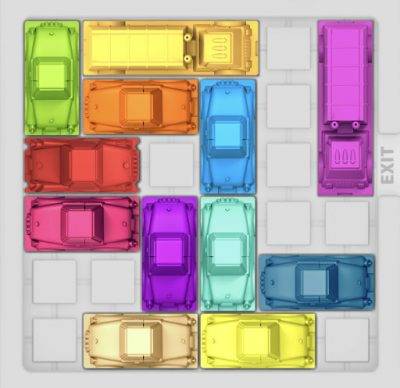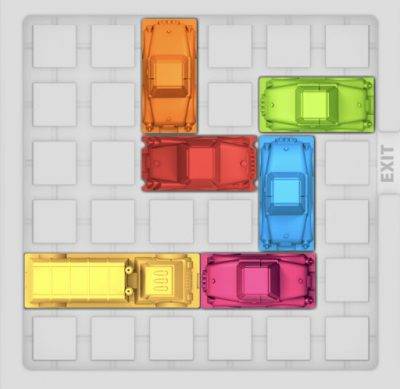
Do You Have Enough Slack in Your System?
9th Jun 2022
Being laid low with Covid over the past week has meant I’ve had to reschedule a lot of appointments. I was due to host a housewarming party. I had a bunch of client commitments in the calendar. And then I was supposed to be flying to Perth to visit family for the first time in a year.
Rescheduling could have been messy. If I’d had a jam-packed schedule, I reckon it would have taken a massive amount of energy and time to find a new place for everything. Like the game Rush Hour, there wouldn’t have been a lot of wriggle room to help me to get the red car to the exit:

But it wasn’t messy. In fact, it was pretty easy. Yes, having Covid meant that rescheduling drained my energy quickly. But it didn’t take a lot of cognitive load to find new slots in my calendar. My ‘Rush Hour board’ looked more like this:

Unexpected spanners in the works (e.g. Covid) are always going to be thrown our way. Yet a ‘spanner in the works’ is an unhelpful metaphor here. It suggests that our lives, our organisations and our communities are predictable machines. When we think in this way, it’s tempting to look at our calendars as something to be optimised for efficiency. Maximum activity = maximum output = good. Not enough activity = not enough output = bad.
Except our lives, our organisations and our communities aren’t machines. They’re complex, adaptive, living systems. Systems that thrive when there’s enough downtime, fallow time, time for letting go and letting be. And I’m not talking about hanging out for the weekends and four weeks’ annual leave. I’m talking about the slack you build into every day.
It’s hard, right? When we link success directly to our level of activity, it’s always going to be hard to create slack. We need to unhook those two ideas.
We say we want our employees and organisations to be adaptable. Yet to be adaptable means to have slack in the system to adapt. If we’re running apace the whole time, when the unexpected happens, we’re going to find it jarring to slow down and adjust to the new reality.
It’s taken me years to learn to pre-build slack into my own system. I keep every Friday, and one whole week out of every month, clear with no appointments. Nothing. Yet I don’t treat this time as a holiday. I call it ‘generative time’. It’s time for me to generate new ideas, generate fresh energy, and generate positive relationships. Or perhaps just to do nothing. It’s not about playing ‘catch up’ and recovering the energy I’ve used during the week or the month. It’s about honouring what we all need: slack. It allows me to be more responsive. And it feels great.
You might be thinking ‘good for you Digby, but I don’t work for myself and I can’t make that type of schedule work.’ Fair call. Yet you probably do have the opportunity to firm up your own boundaries a little more. For me, it’s been about learning to say no to other peoples’ priorities, and deeply, truly prioritising slack time. Where in your life could you do that for yourself?
Slack can take many forms. Another word for it is ‘buffer’. You can have a buffer of time. Equally, you can have a buffer of energy, health, money, relationships, and equipment. It’s that amount of stuff that may look wasteful to those with a mind for maximum efficiency and productivity. In an age of unpredictability and flux, it’s simply smart practice.
The ability to respond, and to evolve, requires us to have slack in the system.
Slack allows us to think longer term. It allows us take the time to consider things from multiple perspectives. It allows us to see ways forward that we might not have seen if we didn’t slow down.
Here’s a game you can play with yourself, or your team. Imagine every new day was a blank canvas. Each day, you have three Post-It notes you can put on the canvas. That’s right, only three. Each Post-It represents one specific thing you can do today. You can’t do any more. What will you choose? What will you put your valuable time and energy into?
This game forces you to throw out your illusions that you can do it all today. And it challenges you to value the blank space on the canvas as much as the Post-Its. And it opens the door for you to breathe out and create some slack.
Cut yourself, and your people, some slack. Your wellbeing deserves it. And your success depends on it.
P.S. Hat tip to Shane Parrish of the Farnam Street blog for his inspiration here 🙂
P.P.S For more inspiration, check out these similar posts:
Like this post? When you’re ready, here are three ways I can help you further:
- Sign up to my ‘Thinking from the Edge’ newsletter to get tips, insights and early release information that I don’t share on the usual social channels. Delivered weekly to your inbox.
- Get my book, Change Makers: How to make your mark with more impact and less drama. It’s available here.
- Check out the Change Makers Programme – a programme + a community to help you make your mark with more impact and less drama.

